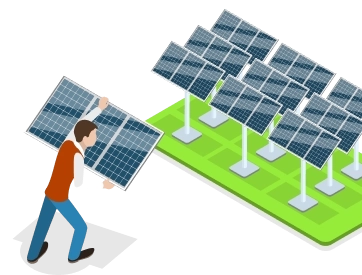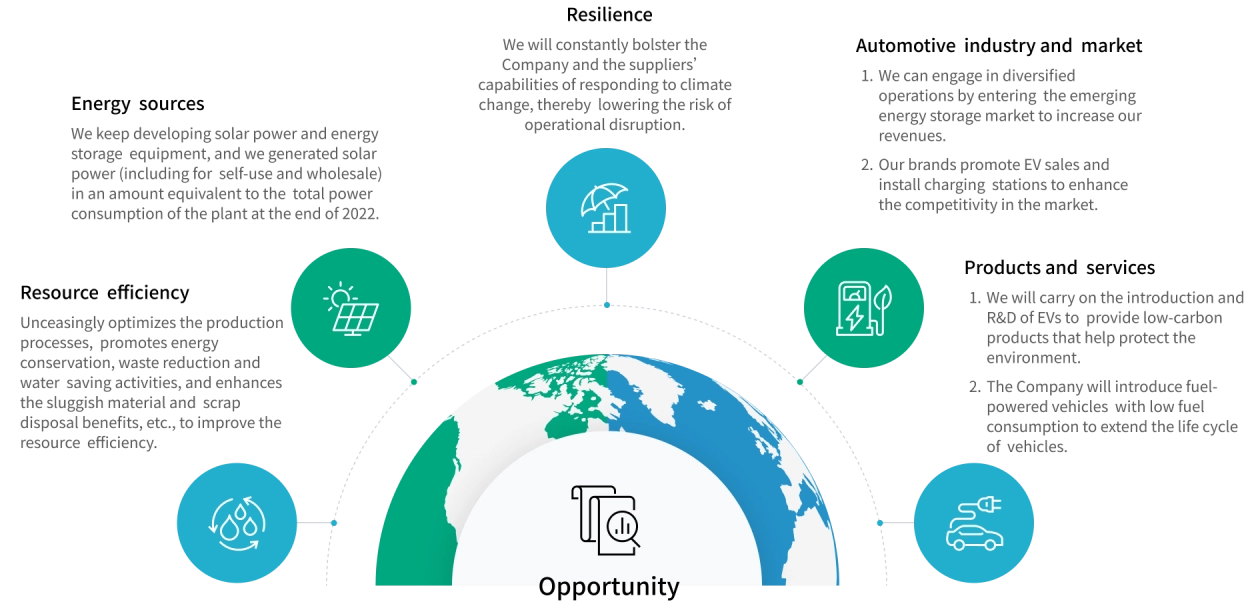Yulon Motor, upholding the faith of corporate growth and coexistence with ecological environment, makes the information disclosure on the four major scopes: governance, strategy, risk management, indicators and goals in accordance with the Task Force on Climate-related Financial Disclosures (TCFD) framework issued by the Financial Stability Board (FSB) and shows our resilience and responding actions amid climate change.
Climate governance
The Board of Directors, as the highest governance unit of Yulon Motor, is responsible for setting the Company’s corporate social responsibility and sustainable development strategies and forming the ESG Committee, which is in charge of facilitating countermeasures for climate change and ESG activities, and is presided by the President. The ESG Committee subsequently establishes a sustainable development organization as the execution unit, which shall report the ESG performance to the Board of Directors. The Board exercises oversight of the implementation of actions for climate change and review any potential operational risks arising from climaterelated risk. The climate-related topics reported in the ESG Committee and the Board of Directors’ meetings in 2022 are as follows:
To boost the incentive for pursuing sustainability, we have incorporated the sustainability topics into the personnel remuneration management mechanism so as to link the performan

Proposed by the Sustainable Development Committee
2022 Summary Report of Stakeholder Communication in accordance with the indicators stated by the Global Reporting Initiative (GRI) and framework of the Task Force on Climate-related Financial Disclosures (TCFD).

Climate strategy
Yulon Motor has proposed four strategies for building a green automotive industry value chain: green materials sourcing, solar power equipment deployment, vehicle electrification, zerowaste resource circulation, manufacturing process improvement and equipment efficiency enhancement, and goals and implementation of product R&D.
-

Green materials sourcing
To procure relevant equipment with a green label
-

Solar power equipment deployment
Solar power equipment with a total of 11MW capacity has been installed until 2022, by which we achieved the goal that the amount of power generated from solar (including for self-use and wholesale) equals to the total power usage of the whole plant.
-

Vehicle electrification
We gradually replace the official fossil fuel vehicles and logistic vehicles at the plant with electric vehicles. In 2022, we replaced 5 logistic vehicles and 11 official fossil fuel vehicles with electric vehicles.
-

Zero-waste resource circulation
To reduce the weight of after-sales packaging materials by 8%/ year and to increase the conversion rate by reuse and recycling to lower the level of environmental impact%
-

Manufacturing process improvement and equipment efficiency enhancement
To improve manufacturing process and equipment efficiency, and to reduce carbon emissions by 2%


Strategic resilience and various applicable climate scenarios
-
 1.5oc
1.5ocScenario temperature increase
-
Net zero emissions and carbon management: in response to the 1.5° C temperature increase limit globally and the national net zero emissions pathway, facilitating the achievement of net-zero by 2050 objective
-
Implementing sustainable production: fostering environmental management, setting up the goal for reduction, and lowering the environmental impact of production
-
Deploying renewable energy: keeping deploying solar energy equipment at the Sanyi site and improving the usage ratio of renewable energy
-
Energy transition management: improving production process and equipment efficiency and electrifying official and logistic vehicles
-
Zero waste resources circulation: lifting waste conversion rate through reduction, reuse and recycling to reduce environmental impact
-
Response to climate change: under the TCFD framework, building a climate change management framework for risks and opportunities and regularly disclosing the progress to stakeholders
-
-
 2.5oc
2.5ocScenario temperature increase
-
When the temperature increase worsens, the intensity of GHG emissions reduction will increase (e.g. 100% green energy at all sites, 100% electrification of official and logistic vehicles, 100% net zero resources circulation).
-
Climate-related risks and opportunities
Yulon checked the potential impact scopes and scales on all operating locations within various time scales (short term: 1 year, mid-term: 1–3 years, long term 3–5 years). These risk impact scales are placed in order, and items with top priority for adoption are selected and listed in the List of Risk and Opportunity Topics of Yulon.
-

 Transition risks
Transition risks -

 Physical risks
Physical risks

Indicators and Targets
The ESG Committee adopts the cycle of plan, do, check and action as the management procedure to assess and identify climate change risks, adjusts and reviews the Company’s risk management policies and approaches on a periodic basis, and modifies the risk management structure and process in a timely manner.
Note: Solar power generated at the Sanyi plant are mainly for self-use and wholesale.














